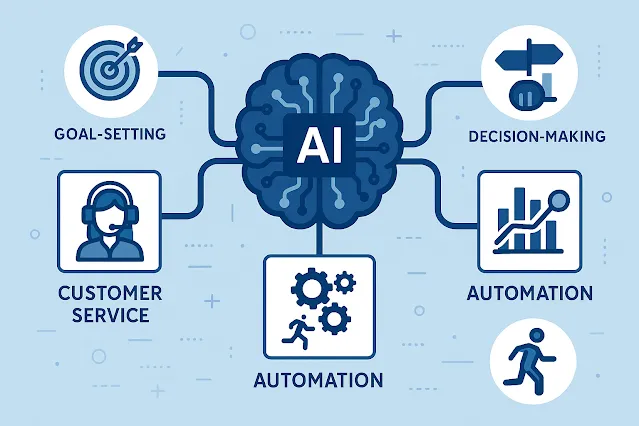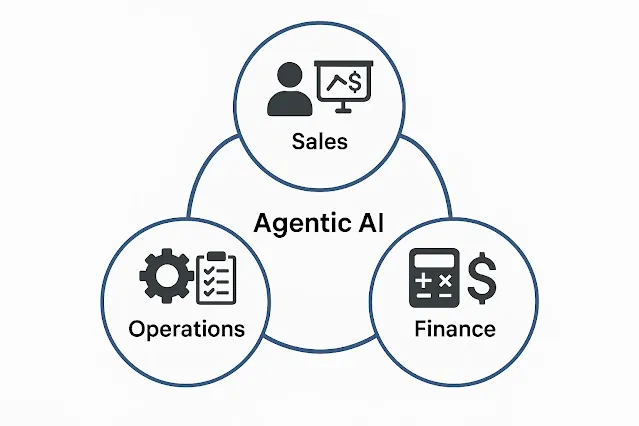Remember when I first heard about "agentic AI" at a tech conference last year? I felt completely lost. Everyone was throwing around terms like "autonomous agents" and "goal-oriented systems," but nobody explained what it actually meant in plain English.
If you're feeling the same way, you're not alone. The AI world moves fast, and keeping up with new concepts can feel overwhelming. But here's the thing – understanding agentic AI isn't as complicated as it sounds, and I'm going to break it down for you in a way that actually makes sense.
What is Agentic AI in Simple Terms?
Think of agentic AI like having a really smart assistant who doesn't just answer questions – they actually get things done for you.
While ChatGPT waits for you to ask it something, agentic AI takes initiative. It's like the difference between a helpful librarian (who answers when asked) and a personal assistant (who proactively manages your schedule, books meetings, and handles tasks without constant direction).
Here's the key difference: Traditional AI reacts to your prompts. Agentic AI acts on your goals.
According to IBM's research on agentic AI, these systems can "perceive their environment, make decisions, and take actions to achieve specific objectives with minimal human intervention."
Image Prompt: Simple comparison infographic showing traditional AI (reactive, waits for commands) vs agentic AI (proactive, takes initiative). Use icons and arrows to show the flow of interaction.
How Does Agentic AI Actually Work?
I like to explain agentic AI using what I call the "GPS analogy."
When you use Google Maps, you:
- Set your destination (goal)
- The system plans the route (reasoning)
- It gives you turn-by-turn directions (actions)
- It adjusts if there's traffic (adaptation)
Agentic AI works similarly:
Goal Setting: You tell it what you want to achieve Planning: It breaks down the task into steps Action: It executes those steps using various tools Learning: It adapts based on results and feedback
But here's where it gets interesting – agentic AI can use multiple tools, call APIs, interact with databases, and even coordinate with other AI agents to complete complex tasks.
Want to see this in action? Try Agentic AI Dynamiq to experience how these systems can automate your workflow end-to-end.
Real-World Examples That Will Blow Your Mind
Let me share some examples that made agentic AI click for me:
Customer Service Revolution
Instead of basic chatbots that follow scripts, agentic AI agents can:
- Access your purchase history
- Process refunds automatically
- Schedule technician visits
- Follow up with satisfaction surveys
- All without human intervention
Personal Finance Management
An agentic AI could:
- Monitor your spending patterns
- Automatically negotiate better rates with service providers
- Rebalance your investment portfolio
- File your taxes
- Send you proactive financial advice
Business Operations
Companies like Salesforce are using agentic AI to:
- Qualify leads automatically
- Schedule meetings based on complex criteria
- Generate and send personalized proposals
- Follow up with prospects at optimal times
Agentic AI vs ChatGPT: What's the Real Difference?
This is probably the question I get asked most often. Here's the breakdown:
ChatGPT (Generative AI):
- Waits for your input
- Generates text responses
- No access to external tools
- Can't take actions in the real world
- Conversation ends when you stop
Agentic AI:
- Can initiate actions independently
- Uses multiple tools and services
- Connects to databases, APIs, and systems
- Takes real-world actions
- Continues working toward goals autonomously
Think of ChatGPT as a brilliant conversationalist, while agentic AI is like having a capable employee who can actually get things done.
Is Agentic AI Safe? (Addressing the Elephant in the Room)
I won't sugarcoat this – autonomous systems do raise legitimate concerns. But here's what leading researchers at MIT are finding:
The Risks:
- Systems might make unexpected decisions
- Security vulnerabilities in autonomous operations
- Potential for errors to cascade across systems
- Need for robust oversight mechanisms
The Safeguards:
- Human-in-the-loop controls
- Strict permission boundaries
- Comprehensive logging and audit trails
- Gradual deployment with extensive testing
The key is starting small and building trust gradually. Most successful implementations begin with low-risk tasks and expand capabilities over time.
How to Get Started with Agentic AI (Your Action Plan)
Ready to dip your toes in? Here's my recommended progression:
Phase 1: Learn the Basics (Week 1-2)
- Understand core concepts (you're already doing this!)
- Explore existing tools and platforms
- Join communities like Reddit's r/artificial or AI Twitter
Phase 2: Hands-On Experience (Week 3-4)
- Try no-code platforms like Agentic AI Dynamiq
- Experiment with simple automation tasks
- Build your first basic agent
Phase 3: Advanced Implementation (Month 2+)
- Learn frameworks like LangChain or CrewAI
- Integrate with your existing tools
- Start building custom solutions
Best Agentic AI Tools and Platforms for 2025
Based on my testing and industry feedback, here are the platforms worth your attention:
For Beginners:
- Dynamiq: User-friendly interface with powerful automation capabilities
- Zapier Central: Familiar workflow automation with AI agents
- Microsoft Copilot Studio: Integration with existing Microsoft ecosystem
For Developers:
- LangChain: Comprehensive framework for building custom agents
- CrewAI: Multi-agent system coordination
- AutoGen: Microsoft's framework for conversational agents
For Enterprises:
- Salesforce Agentforce: CRM-integrated agentic AI
- Google Cloud AI Agents: Scalable enterprise solutions
- IBM watsonx: Enterprise-grade AI agent platform
Common Mistakes to Avoid (Learn from My Failures)
I've made these mistakes so you don't have to:
Mistake 1: Starting too complex
- Solution: Begin with simple, single-task agents
Mistake 2: Ignoring security from the start
- Solution: Build permissions and boundaries early
Mistake 3: Not defining clear success metrics
- Solution: Set measurable goals before implementation
Mistake 4: Expecting perfect results immediately
- Solution: Plan for iteration and improvement
What Industries Benefit Most from Agentic AI?
McKinsey's research shows these sectors leading adoption:
Financial Services: Risk assessment, fraud detection, customer service Healthcare: Patient monitoring, appointment scheduling, data analysis Retail: Inventory management, customer support, personalization Manufacturing: Supply chain optimization, quality control, maintenance Technology: Code review, testing, deployment automation
The Future of Agentic AI: What's Coming Next?
Here's what Harvard Business Review predicts for the next 2-3 years:
- Multi-agent coordination: Teams of AI agents working together
- Industry-specific solutions: Tailored agents for specialized fields
- Better human-AI collaboration: More intuitive interfaces and controls
- Regulatory frameworks: Clearer guidelines for autonomous AI systems
Frequently Asked Questions
Q: Will agentic AI replace my job? A: Most experts believe it will augment rather than replace human work. It handles routine tasks, freeing you for strategic thinking and creative problem-solving.
Q: How much does agentic AI cost? A: Costs vary widely. No-code platforms start around $50/month, while enterprise solutions can cost thousands. Many offer free tiers for experimentation.
Q: Do I need programming skills? A: Not necessarily. Many platforms offer no-code interfaces, though programming knowledge helps for advanced customization.
Q: How long does implementation take? A: Simple agents can be built in hours, while enterprise implementations typically take 3-6 months.
Q: What's the ROI? A: Companies report 20-40% efficiency gains in automated processes, though results vary by use case and implementation quality.
Your Next Steps
Understanding agentic AI is just the beginning. The real value comes from hands-on experience.
Here's what I recommend you do right now:
- Start experimenting: Sign up for a platform like Agentic AI Dynamiq and build your first simple agent
- Join the community: Follow AI researchers and practitioners on social media
- Stay informed: Subscribe to AI newsletters and research publications
- Think practically: Identify one repetitive task in your work that could benefit from automation
The agentic AI revolution is happening now, and early adopters are gaining significant competitive advantages. Don't wait until everyone else catches up.
Final Thoughts
Six months ago, I was intimidated by agentic AI. Today, I use these systems daily to automate research, manage my content calendar, and even help with customer inquiries.
The learning curve isn't as steep as it seems, and the potential benefits are enormous. Whether you're a business owner looking to improve efficiency, a developer wanting to build the future, or simply someone curious about emerging technology, agentic AI offers opportunities you can't afford to ignore.
Remember: you don't need to become an expert overnight. Start small, experiment safely, and build your understanding gradually. The future belongs to those who learn to work alongside intelligent, autonomous systems.
Ready to take the next step? Your journey into agentic AI starts with a single action. What will yours be?



